Writing conferences are such an important part of writing workshop. They give you a chance to get to know your students as writers, help them work on their goals, and keep them on track with their writing.
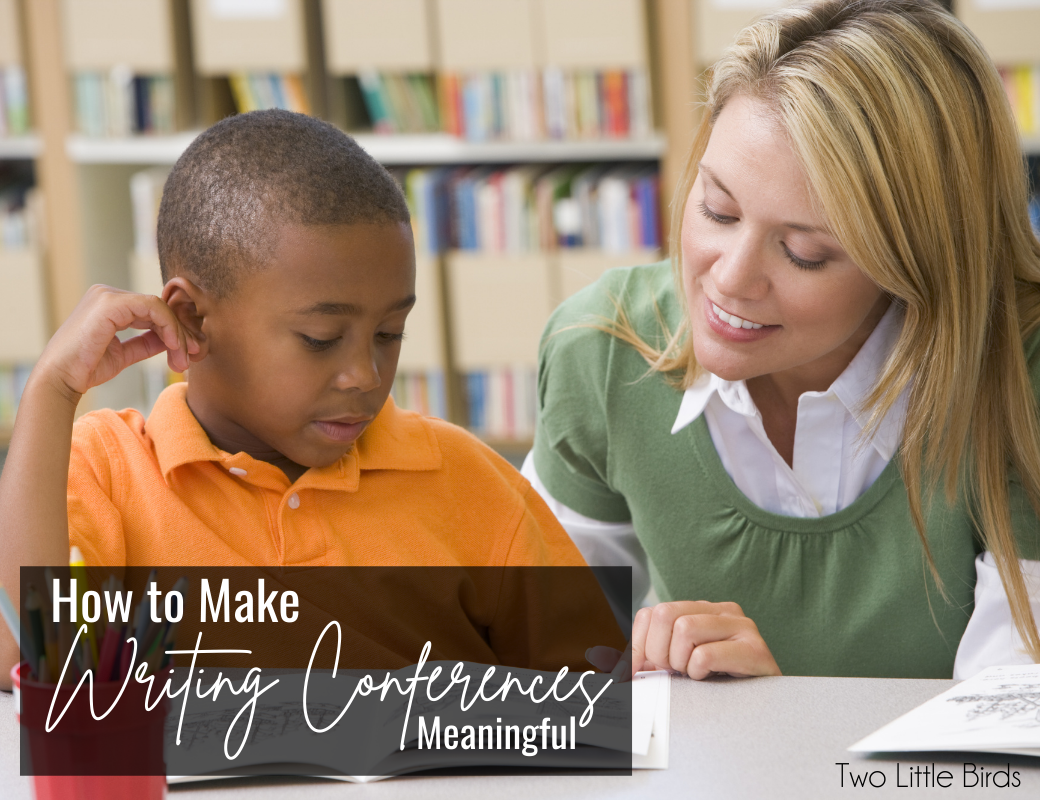
When I first started teaching writing using a workshop model, I didn't know how I could possibly conference with students in a short amount of time. I was spending WAY too much time with each student, which left some students unseen. Conferences became all-consuming during my writing time and I felt our writing projects dragged on for so long, just so that I could meet with each student!
I used to think that conferencing meant sitting with a student, reading their whole piece of writing, revising and editing, and that they'd leave our conference with a picture-perfect piece of writing, filled with my pen markings that they would go and fix on their own.
Whoa…was I wrong!! A conference does not mean that the student needs to walk away with zero mistakes left on their paper. I quickly learned from my own mistakes!
So, now that we know what a writing conference IS NOT, let's get into what IT IS.

What is a Writing Conference?
A writing conference happens while students are writing independently. There are three effective ways to conference with students: one on one, small groups, and student/peer conferences.
A conference gives you a chance to listen to students as they read their writing and a chance to ask them to elaborate on their writing, ideas, and thoughts. It is the perfect time to motivate and encourage students while also focusing on the skills that have been taught in your mini-lessons.
You can look at students' writing with a critical eye, pointing out the positives in their writing, but also encourage any changes that are needed. Many times, students have a hard time making revisions on their own, and conferencing is the best time to motivate them to make meaningful changes.
While you are conferencing during independent writing, it's important that other students are productive. This is why it's so important at the beginning of the year to really go through all procedures and cover every scenario that would possibly derail their productivity. Your writing workshop will become a well-oiled machine, with everyone working on their own thing, doing their part.
One-on-One Conferences
A one-on-one conference should be short but sweet…I'm talking about 5 minutes!
I know, that does not sound like much time. But let's think, if you are meeting with all of your students for 7-8 minutes, you would only be able to meet with 2-3 students a day. By the time you get through your cycle of conferences, some students may get lost in the shuffle. If you keep each conference under 5 minutes, you can meet with a lot more students in one day.
Just like mini-lessons are short but sweet, you have to get right to work during a one-on-one conference to keep it short.

Tips for keeping the conference short:
- Keep notes for each student to stay organized. You will be able to quickly see what you discussed at the last conference and their goals so you can get right to conferencing.
- Do a quick check in and ask the student what they have been working on since you last met and what are they focusing on right now.
- Check out what they've worked on most recently.
- Discuss things you love and things that could be improved.
- Leave them with one action item so that when they head back to write they know exactly what they need to do.
Here's a few questions you could ask during a one-on-one conference:
- What are you working on?
- Can you read what you have writen so far?
- Is there anything that you would like help with?
- What are you going to do next?
What is the teacher's job in a one-on-one conference?
- Make a connection to your last conference
- Give a compliment, try to focus the compliment around the goal or the skill taught in the mini-lesson
- Give a tip or something related to their goal
- Ask specific questions about their writing and then listen as they talk (this is the real meat of the conference, right here!)
- Discuss their writing goal and give an action item to work on as they continue their writing
And when you wrap up the conference, make sure to take notes so that you can look back as a reminder of what was discussed and the goals that were set.
What is the student's job in a one-on-one conference?
- Shares their goal
- Reads a section of their writing
- Discusses their writing with thoughtful prompts from the teacher when necessary
- Considers if they've met their goal
- Works to set a new goal
- And let them brag about themselves!! They are working hard, meeting their goals, growing as writers. Give them time to share their excitement about their goals and about their writing!

Small Group Conferences
After doing one-on-one conferences, you are able to see which students have similar needs and will be able to have small group conferences.
With 4-5 students in a small group, you can meet for ten minutes or less. You will be able to conference with a lot more students in a day compared to doing individual conferences.
Group conferences are convenient and effective, but you also do not want to do small group conferences every day of your writing workshop. You will not have an understanding of student goals and grouping students properly based on their goals if you miss out on the one-on-one time.
You can group students according to the step they are in the writing process, the goals that they are working on, or according to the skill that you'd like them to focus on.

How can you group students for small group conferences?
- Students may need help with revising or editing even though they may be working on different skills.
- You may also have some students that are ahead or behind and meeting with that small group can be beneficial to help with the step of writing they are in.
- Focusing on a specific skill is perfect for small groups because each student may have a different example of how to apply that skil. Your group can learn from each of the examples discussed as they head back to apply to their own writing.
- You do not have to keep the same small groups, you can meet with students in multiple, different groups.
Ten minutes goes quickly with a small group, so remember: everyone's paper will not be perfect and you do not need to read everyone's entire piece of writing. Think about the purpose of your small group conference and stick to it to stay within the 10 minute time frame.

Peer Conferences
Students can be an amazing resource for each other too! While you are meeting with students one-on-one or in small groups, you do not want to be interrupted. Remember the well-oiled machine that runs without you? Well, that includes students quick conferencing with each other while you are conducting conferences as well.
Students can meet together to do a quick check to make sure they are working on the focus skill from the mini-lesson, ask for help with revising or editing, or do a quick status check with where they are in their writing.

How will students know who to conference with?
- Have a system set up for student conferencing where students can just go right up and ask a friend for help.
- Create a sign up for students looking for a friend to conference with.
- Or you could have something that indicates students are looking to conference. I have used conference critters (yes, upper elementary kids still love using stuffed animals!!!). If you have a critter on your desk, that means you're looking for a friend to conference with.
All of this will be happening on its own while you are holding your own conferences. By modeling at the beginning of the year, your students will know exactly what is expected of them during their student conferences and you can continue your own conferences without worry!
Tips for Peer Conferences
The important thing is that students keep their peer conferences short too! Have timers available so that their entire independent writing time is not just spent conferencing. A short and sweet conference can make a big difference in student writing, but you don't want it to take over their own writing time.

Just picture it in your head. You are sitting with a small group, focusing on a skill that they have been working on in their writing. Students are scattered around the room in their favorite writing spots, hard at work. There's a pair of students quietly conferencing in one corner. Another small group of students is conferencing at a table in the back. Everyone is focused on the task at hand. They're motivated. Students will be inspired. They're writing!!! All. The. Heart. Eyes.
THIS is when you know that the hard work you put in launching writing workshop is paying off!
I have some free conferencing materials that I think you will find helpful while conferencing with your students…

You can read more about conferencing with students in THIS POST about reading conferences.
Lastly, find more ideas & tips for writing workshop in THESE POSTS.
Shop more writing resources here:
-
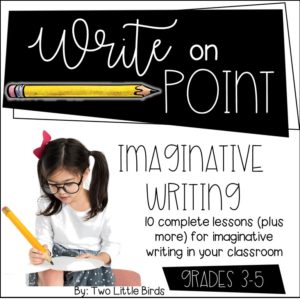 Writers Workshop: Imaginative/Fictional Narrative Writing Unit Lessons, Posters$12.50
Writers Workshop: Imaginative/Fictional Narrative Writing Unit Lessons, Posters$12.50 -
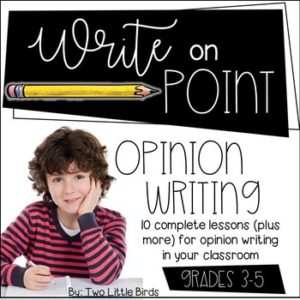 Writers Workshop Opinion Writing Unit | Prompts | Graphic Organizers & More$12.50
Writers Workshop Opinion Writing Unit | Prompts | Graphic Organizers & More$12.50 -
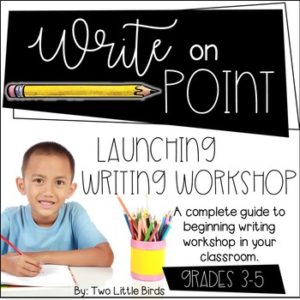 Writer's Workshop: Launching Writer's Workshop Unit$15.00
Writer's Workshop: Launching Writer's Workshop Unit$15.00 -
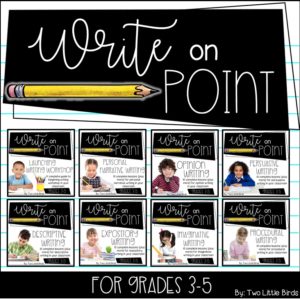 Writers Workshop: Writing Workshop Lessons, Writer's Notebook, Posters Bundle$51.50
Writers Workshop: Writing Workshop Lessons, Writer's Notebook, Posters Bundle$51.50
Happy Writing!!

